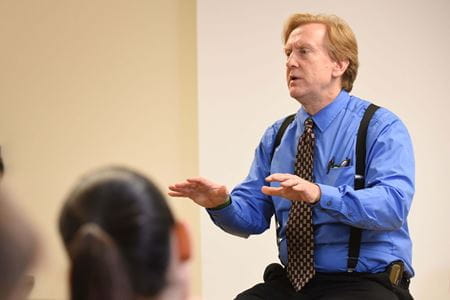From its expertise in training future pediatricians, radiologists and surgeons to its collaborations with local physicians, national institutions and international leaders—Indiana University School of Medicine knows a thing or two about medical education. But what if medical education had another layer not often discussed? What if the largest medical school in the country wasn’t only training outstanding physicians, but future storytellers?
During a recent discussion, Richard Gunderman, MD, PhD emphasized the importance of storytelling in a learner’s education and training as a physician. Gunderman, who serves as vice chair of education for the Department of Radiology and Imaging Sciences, correlated how some of the greatest minds learned through failure and how that experience can lead to better questions, deeper stories and personalized patient care.
When you think about storytelling, medical education isn’t normally what comes to mind. Why is storytelling such a fundamental aspect for current and future physicians?
So often it turns out that a root cause for a patient’s illness isn’t an infection or cancer, it’s that they hate their job, somebody in their household is battling drug addiction, or they live in a crime-ridden neighborhood. We need storytelling to help fill in the lines. We need stories to help us see what kind of lives we want to lead and what kind of people we want to be. And we need people in our lives who will share stories. Stories about what it’s like to take good care of a patient. Stories about what it’s like to be well cared for by a doctor or a nurse. That’s how we’re going to truly learn. Not from stopwatches or rulers or dashboards on computers. It’s by watching human beings in action and hearing them.
How are stories often minimized or forgotten?
You would expect in health care to find story after story, even just between doctor and patient. But, in an effort to make everything fit inside an electronic health record, we frequently squeeze the story. We negate the narrative aspect out of things in order to end up with data. When was the last time a medical student sat down and wrote out their patient’s story and history to better understand their current state? We encourage students and trainees to collect data points rather than synthesize a coherent narrative of what the patient’s experiencing, which may extend far beyond their vital signs.
We’re often compelled to ensure we ticked off all the boxes. Weight, check; blood pressure, check; breathing, check. But outside the box, we must ask ourselves “How well do I really know this patient?”
We’re really good at grinding conclusions out of large collections of data. But knowing and caring for a human being is different from grinding conclusions of large collections of data. Data isn’t useless, but it’s just a subsidiary tool, not the brass ring. The information system is kind of like a computer that quantifies to give us algorithms and standardizes everything. But part of a human being is that we’re not standard. So, why should our patient care be?
Sometimes people have a tendency to strive for perfectionism. How do you challenge that for yourself and your trainees?
Well, I think one way to do it is to realize that no one is perfect. Another way is for us to make sure that mistakes are shared and to encourage our learners to formulate questions and pursue the answers. So often with students and residents they’re supposed to know the right answer. Yes, we need to know the correct answers, especially when it comes to patient care. Nonetheless, how amazing would it be if we empowered our students to come up with really good questions that intrigue and puzzle? I think it’s worth pursuing. It’s a totally different but valuable way of thinking for medical students who will one day be physicians in charge of finding questions that help discover answers to ailments. Anyone can memorize an answer; not everyone can ask a really good question.
How have you learned from failure and disappointment?
I think partly that storytelling involving failure, which might sound discouraging, is in fact deliberate. The greatest inventors and researchers failed a lot. But the way science tends to get taught is that it often looks like science automatically goes to triumph. We forget that when people tried to build or create something, they often had to tear it down and start from scratch. These experts were always learning. We desperately need to cultivate an appreciation in medical students of how important failure and disappointment are. That’s where the learning takes place. I feel like that’s part of a mission for me to try to share some of the stories that I think might help us see what we’re really striving to do and become. Perhaps I can serve as a kind of conduit for the words and actions of wiser people.
Learn more about IU School of Medicine’s Precision Health Initiative and how its Graduate Medical Education is training the next generation of storytellers.
